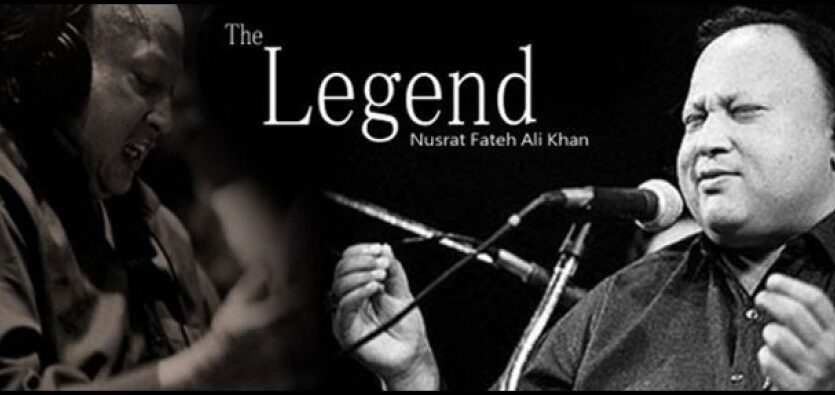The Timeless Voice: Nusrat Fateh Ali Khan, the Shahenshah-e-Qawwali
Introduction
Parvez Fateh Ali Khan, better known by his stage name Ustad Nusrat Fateh Ali Khan, was a legendary Pakistani singer, musician, and music director. Born in October 1948 in Faisalabad, he came from a family that had been practicing and performing Qawwali music for over 600 years. Nusrat Fateh Ali Khan was a master of the Sufi music genre of Qawwali and was widely recognized as the “Shehnshah-e-Qawwali, or the Emperor of Qawwali. His unique and soulful voice resonated with audiences all over the world, making him a global icon of Qawwali music.
Nusrat Fateh Ali Khan’s Early Life and Musical Journey
At the tender age of three, Nusrat Fateh Ali Khan started his musical journey by learning tabla from his father, Fateh Ali Khan. However, destiny had something else in store for him. After his father’s demise, he switched to vocal music and received guidance and training from his uncles, Mubarik Ali Khan and Salamat Ali Khan. It was during his father’s Chehlum, a commemorative gathering held on the 40th day after someone’s death, that Nusrat Fateh Ali Khan showcased his remarkable stamina by singing continuously for hours and captivating the audience.
Guinness World Records and International Recognition
Nusrat Fateh Ali Khan’s contribution to Qawwali is unparalleled. He holds two Guinness World Records for the largest recorded output by a Qawwali artist, with over 125 albums to his name, and for the longest recorded Qawwali, which lasted for a mesmerizing 115 minutes. His exceptional talent and mesmerizing performances took Qawwali to new heights and made him a global sensation.
Nusrat Fateh Ali Khan: Global Performances and Achievements
Nusrat Fateh Ali Khan’s popularity transcended borders, and he mesmerized audiences with his soulful performances around the world. Some of his notable performances and collaborations include the following:
- Performing at the World of Music, Arts, and Dance in London in 1985.
- Entertaining audiences in Paris during his invitation to the musical concerts from 1985 to 1988.
- Enthralled the audience at the 5th Asian Traditional Performing Art Festival in Japan in 1987.
- Took New York by storm with his performance at the Brooklyn Academy of Music in 1989.
- Collaborated with Peter Gabriel for soundtracks, concerts, and the release of five albums in 1988.
- Worked with composer Andrew Kristy and producer Johnny Haynes on a series of fusion tracks at Zella Recording Studios in Birmingham, UK, in 1989.
- Received recognition from the BBC with an entire program on Network East and an invitation to perform “Allah Hoo” live on Big World Café in 1990.
- Served as a visiting artist at the University of Washington in 1992.
- Collaborated with numerous global artists, including Canadian guitarist Michael Brook, Pearl Jam’s lead singer Eddie Vedder, and Jonathan Elias, among others.
- Recorded hundreds of albums worldwide, with labels such as Real World Records, Virgin Music, Ocora, World Music Network, Shanachie, Nascente, American Records, EMI Arabia, & France.
- Released around 125 audio albums and 30-35 concert films through OSA, Birmingham.
- Recorded 40–50 cassettes in Pakistan, many of which are available under the EMI label.
Awards and Achievements of Nusrat Fateh Ali Khan
Nusrat Fateh Ali Khan’s mesmerizing vocals and profound impact on Qawwali music earned him numerous accolades and recognition. Some of his notable awards include:
- The President of Pakistan’s Award for Pride of Performance in 1987.
- The UNESCO Music Prize in 1995.
- The Grand Prix des Amériques at the Montreal World Film Festival in 1996.
- The Arts and Culture Prize of the Fukuoka Asian Culture Prizes in 1996.
- The PTV Lifetime Achievement Award in 1998.
His remarkable talent and contributions led to him being referred to by various titles in different parts of the world, such as the ‘Singing Buddha’ in Tokyo, ‘The Voice of Paradise’ in Los Angeles, ‘Quintessence of the Human Voice’ in Tunis, ‘The Spirit of Islam’ in London, ‘Pavarotti of the East’ in Paris, and the ‘Emperor of Qawwali’ (Shahenshah – e – Qawwali) in Pakistan and India.

Interesting Facts about Nusrat Fateh Ali Khan
- During his first tour to India in 1979, he revealed in an interview that he had been visualizing the Ajmer Shareef shrine in his dreams, where he was singing Qawwali.
- Nusrat Fateh Ali Khan actively participated in humanitarian causes and frequently performed at charity events to raise funds for various social and community projects. Notably, he performed at Imran Khan’s charity appeal concert in 1992 to raise funds for the Shaukat Khanum Memorial Cancer Hospital and Research Center.
- His music was an inspiration to the Pakistani cricket team during the famous 1992 World Cup. The players would listen to his songs and Qawwalis before taking the field for motivation and passion.
- Nusrat Fateh Ali Khan struggled with his health throughout his life, weighing around 300 pounds and facing difficulty walking due to knee pain.
- He dedicated extensive hours to his craft, locking himself in practice sessions for 20 hours a day during the early stages of his career.
- His versatility extended beyond the Urdu language, as he also sang Qawwalis in Punjabi, Farsi, and Arabic, allowing him to connect with diverse audiences.
- Surprisingly, Nusrat Fateh Ali Khan was more famous in India and the Western world than in Pakistan itself, with active listeners on platforms like YouTube predominantly from these regions.
- The earnings from his concerts were equally shared among his four sisters’ families and the Qawwali band, reflecting his commitment to his family and his band members.
- Acclaimed Indian lyricist Javed Akhtar observed different facets of Nusrat Fateh Ali Khan’s personality, seeing both a childlike innocence and a serious dedication to his craft.
- Nusrat Fateh Ali Khan’s childhood friend, Hasan Nisar, recalls fond memories of playing with wooden swords and Nusrat’s nickname, “Peji.” He also recounts Nusrat’s struggle with pronouncing the Hindi word “Ghar” while singing.
- In an interview, Nusrat Fateh Ali Khan traced his ancestral history from Afghanistan to Hindustan 600 years ago, as his ancestors followed a Muslim Sufi leader and settled in Jalandhar before eventually moving to Faisalabad after partition.
Nusrat Fateh Ali Khan’s Death and Successor
Sadly, after battling a serious illness, Nusrat Fateh Ali Khan passed away at the Cromwell Hospital in London on August 16, 1997, at the age of 48. He left behind an unparalleled musical legacy that continues to influence and inspire people around the world. Before his demise, he nominated his nephew Rahat Fateh Ali Khan as his successor, who had been under his tutelage since the age of three.
Rahat Fateh Ali Khan carries forward the family’s rich tradition of Qawwali music, keeping the flame of Nusrat Fateh Ali Khan’s legacy alive for Indo-Pak and global fans of Qawwali and Sufi songs.
In conclusion, Nusrat Fateh Ali Khan’s timeless voice and extraordinary musical genius have left an indelible mark on the world of music. His soul-stirring Qawwalis continue to touch hearts, and his legacy lives on through his nephew, Rahat Fateh Ali Khan. Through his extensive body of work, remarkable performances, and unique ability to connect with diverse audiences, Nusrat Fateh Ali Khan will forever be remembered as the legendary Shahenshah-e-Qawwali.

